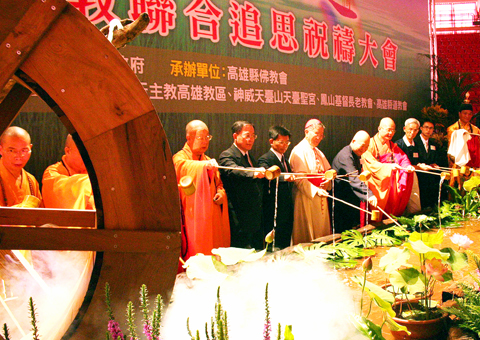Legislators across party lines yesterday pushed for the passage of a bill aimed at preventing a repeat of the tragedy that occurred in Kaohsiung County’s Siaolin Village (小林) last year when Typhoon Morakot hit Taiwan and wreaked havoc on the south.
Democratic Progressive Party Legislator Tien Chiu-chin (田秋堇) contended that the disaster, in which many of the village’s residents were buried alive by a massive landslide, could have been prevented if the village’s geological changes were monitored beforehand under the stipulations of the draft geology act.
The proposed bill under consideration obliges the Ministry of Economic Affairs to designate regions with special geological characteristics or that are vulnerable to geological disasters as “geologically sensitive areas.”

PHOTO: CNA
It also stipulates that a commission should be established to review proposals to designate, change or abolish the listing of areas as “geologically sensitive” and that no fewer than half the members of the commission be experts and academics.
Urging that the draft geology act be passed into law during a provisional legislative session to be held later this month, Tien said the draft act would require the government to make public a list of geologically sensitive areas nationwide and hopefully prevent catastrophic landslides.
Chinese Nationalist Party (KMT) Lin Tsang-min (林滄敏) also backed the legislation, saying it was not too late to take precautions after suffering such severe losses.
“Better late than never. Without a geology law, private properties can still be built and public construction projects developed on geologically sensitive areas,” Lin said.
Lin said, however, that the draft legislation, which was approved by a legislative committee in May, was unlikely to clear the full legislature in the middle of this month because of a tight legislative schedule.

Chinese spouse and influencer Guan Guan’s (關關) residency permit has been revoked for repeatedly posting pro-China videos that threaten national security, the National Immigration Agency confirmed today. Guan Guan has said many controversial statements in her videos posted to Douyin (抖音), including “the red flag will soon be painted all over Taiwan” and “Taiwan is an inseparable part of China,” and expressing hope for expedited reunification. The agency last year received multiple reports alleging that Guan Guan had advocated for armed reunification. After verifying the reports, the agency last month issued a notice requiring her to appear and explain her actions. Guan

GIVE AND TAKE: Blood demand continues to rise each year, while fewer young donors are available due to the nation’s falling birthrate, a doctor said Blood donors can redeem points earned from donations to obtain limited edition Formosan black bear travel mugs, the Kaohsiung Blood Center said yesterday, as it announced a goal of stocking 20,000 units of blood prior to the Lunar New Year. The last month of the lunar year is National Blood Donation Month, when local centers seek to stockpile blood for use during the Lunar New Year holiday. The blood demand in southern Taiwan — including Tainan and Kaohsiung, as well as Chiayi, Pingtung, Penghu and Taitung counties — is about 2,000 units per day, the center said. The donation campaign aims to boost

The Kaohsiung Tourism Bureau audited six hotels in an effort to prevent price gouging ahead of Korean band BTS’ concert tour in the city scheduled for Nov. 19, 21 and 22 this year. The bureau on Friday said that the audits — conducted in response to allegations of unfair pricing posted on social media — found no wrongdoing. These establishments included the local branches of Chateau de Chine, Hotel Nikko, My Humble House, and Grand Hai Lai, it said, adding that the Consumer Protection Commission would have penalized price gougers had the accusations been substantiated. The bureau said the Tourism Development Act

BACK TO WINTER: A strong continental cold air mass would move south on Tuesday next week, bringing colder temperatures to northern and central Taiwan A tropical depression east of the Philippines could soon be upgraded to be the first tropical storm of this year, the Central Weather Administration (CWA) said yesterday, adding that the next cold air mass is forecast to arrive on Monday next week. CWA forecaster Cheng Jie-ren (鄭傑仁) said the first tropical depression of this year is over waters east of the Philippines, about 1,867km southeast of Oluanpi (鵝鑾鼻), and could strengthen into Tropical Storm Nokaen by early today. The system is moving slowly from northwest to north, and is expected to remain east of the Philippines with little chance of affecting Taiwan,